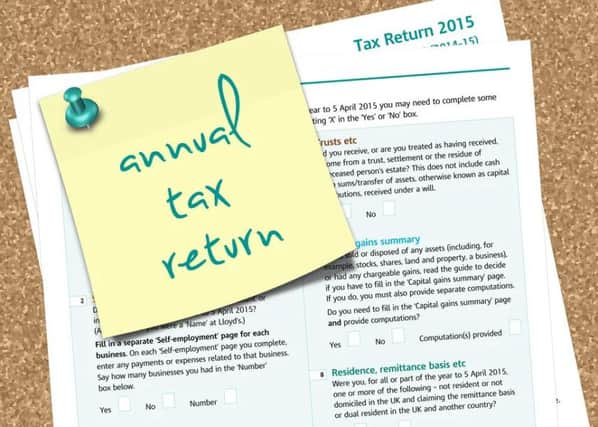Self-assessment tax deadline is next week - don't miss the cut off!


In fact, if this is the first time you’ve self-assessed, you’ll need to get registered with HMRC sharpish - in general it could take up to 10 days to receive the necessary details to let you complete your form.
You’ll also need to pay any tax owed by that date, or incur a fine.
Advertisement
Hide AdAdvertisement
Hide AdThe taxman accepts very few excuses for late receipt of returns - although the recent spate of bad weather and flooding could be viewed as a legitimate reason, so a hotline has been set up (0800 904 7900) for anyone affected.
So when is your tax return due?
The deadline for sending 2014-15 tax returns to HM Revenue & Customs is Sunday January 31 2016 - that’s just over week away.
Aside from getting it in on time, here are four more things to look out for when filling in your return:
Don’t forget to declare all income and Capital Gains
Omitting a source of income from your tax return can result in serious penalties especially if the error is found to be deliberate. Sources range from rent on a property, to payment from playing in a band at the weekend - which could be cash-in-hand. However, income from ISAs and Premium Bonds, and National Lottery winnings are all exempt from tax - refer to the HMRC guidance if in doubt. This income should be entered onto supplementary pages - so don’t forget to include these too.
Advertisement
Hide AdAdvertisement
Hide AdIncorrect National Insurance number or Unique Taxpayer Reference
The Unique Taxpayer Reference (UTR) is, as its name suggests, unique to you. It’s a 10-digit reference code to be found on everything you receive from HMRC. Your National Insurance number is also unique to you. A mix of numbers and letters, it will look something like QQ 12 34 56 A and can be found on payslips or your P60.
Where’s there’s a claim?
Again, refer very carefully to the HMRC advice on what you can claim for to lessen your tax bill. Mileage allowances, charitable donations and even uniforms are eligible. If you’re self-employed, phone and broadband, and even utilities like gas, electricity and water can be claimed back - on a pro rata basis, that is. So if your home office occupies a fifth of your house then that’s 20% of the bill to put into your calculations. Even your mortgage interest can figure in your calculations - but again, read the small print, or, if you have one, check with your accountant.
The basics: bad maths and blank boxes
There’s nothing worse than getting your calculations wrong, and you might even lose out. There are plenty of pitfalls - the easiest mistake to make may be including the gross interest rather than the net amount (i.e. after tax). HMRC supply a step-by-step guide to filling in your return, and online forms will help by flagging up errors on your return. However, they can’t prevent clumsy fingers on your calculator, so make sure to double-check everything. The paperwork sent by HMRC and the online includes a guide to completing your tax return.
Finally, don’t forget box 22 - sign and date your form.
And don’t miss the deadline!